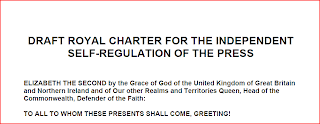Publishers representing most of the national and local newspaper and magazine industry have proposed their own draft Royal Charter for a new system of press self-regulation and rejected the one proposed by the Government.
They say the Royal Charter published by the Government on 18 March has no support within the press and claim a number of its recommendations are unworkable and that it would give politicians an unacceptable degree of interference in the regulation of the press.
A press release from the Newspaper Society said: "This initiative by the UK’s national, regional and magazine publishers completely accepts the need for a new regulator to be recognised by a genuinely independent body – which was a central conclusion of the Leveson Inquiry - and aims to help move the debate about the future regulation of the press to a constructive conclusion. Importantly, there will be a public consultation on the industry’s proposals giving newspaper and magazine readers the chance to have their say – a consultation that the Government has refused for its state-sponsored scheme.
"The industry’s proposal is closely based on the draft Royal Charter published on 12 February which had been painstakingly negotiated with national and local newspapers and magazines, and accepted by Ministers. It is a workable, practical way swiftly to deliver the Leveson recommendations, which the industry accepts, without any form of state-sponsored regulation that would endanger freedom of speech. It has widespread backing across the industry. It will deliver a system of regulation which will provide real protection for the public and which offers:
• tough sanctions, with the new regulator having the power to impose fines of up to £1 million for systematic wrongdoing ;
• up-front corrections, with inaccuracies corrected fully and prominently;
• strong investigative powers enabling the regulator to investigate wrongdoing and call editors to account;
• genuine independence from the industry and from politicians with all the bodies making up the new regulator having a majority of independent members appointed openly and transparently; and
• public involvement in the framing of the Code of Practice which binds national and local newspapers and magazines.
The publishers claim: "This Royal Charter proposal will deliver on Leveson and bind the UK’s national and local newspapers and magazines to a tough and enduring system of regulation – tougher than anywhere else in the western world – which will be of real benefit to the public, at the same time as protecting freedom of speech."
- The Newspaper Society says council newspapers such as East End Life and Greenwich Time which compete for readers and ad revenues with independent local papers would be exempt from the Government's Royal Charter proposals for press regulation.
- You can see the draft Royal Charter here.





